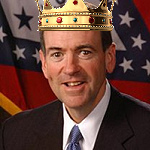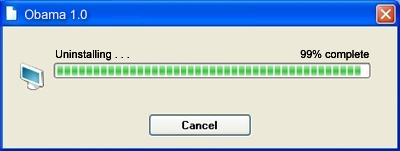http://www.archives.gov/federal-registe ... about.html
Little refresher on how it works.
I don't have much problem with most of the mechanics. It's a good way to ensure that all people are represented fairly, in principle. Or, at least, it affords the same amount of representation as our Congress.
My problem is that it doesn't quite live up to its billing. That's because the vast majority of states require for ALL of their electors to vote for the single candidate that garners the most votes in their respective state. So, if a state votes 43% for Obama, 37% for Romney, and 10% for various other candidates, then that ENTIRE state's electors vote for Obama. Contrast that with Congress, where each Rep or Senator would be free to vote as they pleased, which would (theoretically) result in 4-5 votes for Obama, 4 votes for Romney, and 1 vote for another candidate.
Because the election for President is clearly a matter of national priority, the Fed would be well within its rights to mandate certain voting laws for a Presidential election. The Fed should, therefore, enact a law saying that no state shall designate all of its electors, and shall instead apportion them according to the popular vote within that state.
This would result in every state being in play again, instead of just a few. While large states would receive more attention from candidates, the attention paid to each citizen would be roughly equal.
Our current system discourages voting in "safe" states by those who would vote for the candidate less likely to win. For instance, it's highly unlikely that Obama would win Louisiana. He spends almost no time running here. And, because everyone knows that all of Louisiana's electors will vote for Romney, why should an Obama supporter go vote? Conversely, if the electoral votes were apportioned, then there would be a good chance that Obama might get 2-3 of our 8 votes.
Electoral college changes
Re: Electoral college changes
I'm all for doing it with proportions of states, but I'd be against doing it by Congressional districts because then we'd just end up with the same problem but with safe districts rather than safe states being ignored.

-

OGPhilly - Banned

- Posts: 3616
- Joined: Sun Aug 19, 2012 2:31 pm
- Location: NYC
- Gender:

- Has thanked: 274 times
- Been thanked: 278 times
- Political Leaning: Liberal
Re: Electoral college changes
To me, the only way that is fair is by the popular vote. If you don't do it that way then you run the risk of lots of peoples votes not counting directly for who they voted for, the OP is an example of that. If 51% of the people in a state vote for Obama its not fair that 49% of the people's votes are NOT counted because their electoral college won't vote at the same percent for the president that they did. After all, isn't the electoral college supposed to represent the people? If it's not accurately doing that, then why is it still in existence?
"Police protection" is an oxymoron. Gun laws are like masturbation, they both feel really good, but after you're done you realize you haven't accomplished anything."
-

dontworrybehappy - Senator
- Posts: 1848
- Joined: Tue Aug 21, 2012 7:13 am
- Gender:

- Has thanked: 68 times
- Been thanked: 67 times
- Political Leaning: Libertarian
Re: Electoral college changes
Americans learn only from catastrophe and not from experience. -- Theodore Roosevelt
My life has become a single, ongoing revelation that I haven’t been cynical enough.
My life has become a single, ongoing revelation that I haven’t been cynical enough.
-

John Galt - Technical Admin
- Posts: 14869
- Joined: Sat Aug 18, 2012 3:22 pm
- Location: Bowling Green Massacre Survivor
- Gender:

- Has thanked: 719 times
- Been thanked: 1497 times
- Political Leaning: Classic Liberal
Re: Electoral college changes
Im personally for dismantling the EC and going by pop vote, the only reason it still exists is to give smaller states some lip service to pandering politicians.

- PoS
- Governor
- Posts: 4268
- Joined: Sun Aug 19, 2012 12:50 pm
- Location: Oceania
- Gender:

- Has thanked: 495 times
- Been thanked: 309 times
- Political Leaning: Fascist Libertarian
Re: Electoral college changes
So, according to the graphic above, they would focus on the areas with more people? Isn't that what we want?
Yes, the people in Iowa might receive fewer visits and attention. But, with a population of only 3,000,000 people, then theoretically they should get half the attention that the people in Tennessee get (Pop=6,400,000), less than 1/8 the attention that the people in Texas get (pop=25,600,000) and less than 1/12 than the people in CA.
Yes, the people in Iowa might receive fewer visits and attention. But, with a population of only 3,000,000 people, then theoretically they should get half the attention that the people in Tennessee get (Pop=6,400,000), less than 1/8 the attention that the people in Texas get (pop=25,600,000) and less than 1/12 than the people in CA.

-

Professor - VIP

- Posts: 7553
- Joined: Mon Aug 20, 2012 2:42 pm
- Location: New Orleans, LA
- Gender:

- Has thanked: 54 times
- Been thanked: 570 times
- Political Leaning: Rockefeller Republican
Re: Electoral college changes
Yeah, making Cali, Texas, and NY irrelevant in order to ensure that Iowa isn't being ignored is pretty illogical.

-

OGPhilly - Banned

- Posts: 3616
- Joined: Sun Aug 19, 2012 2:31 pm
- Location: NYC
- Gender:

- Has thanked: 274 times
- Been thanked: 278 times
- Political Leaning: Liberal
Who is online
Users browsing this forum: No registered users and 72 guests


